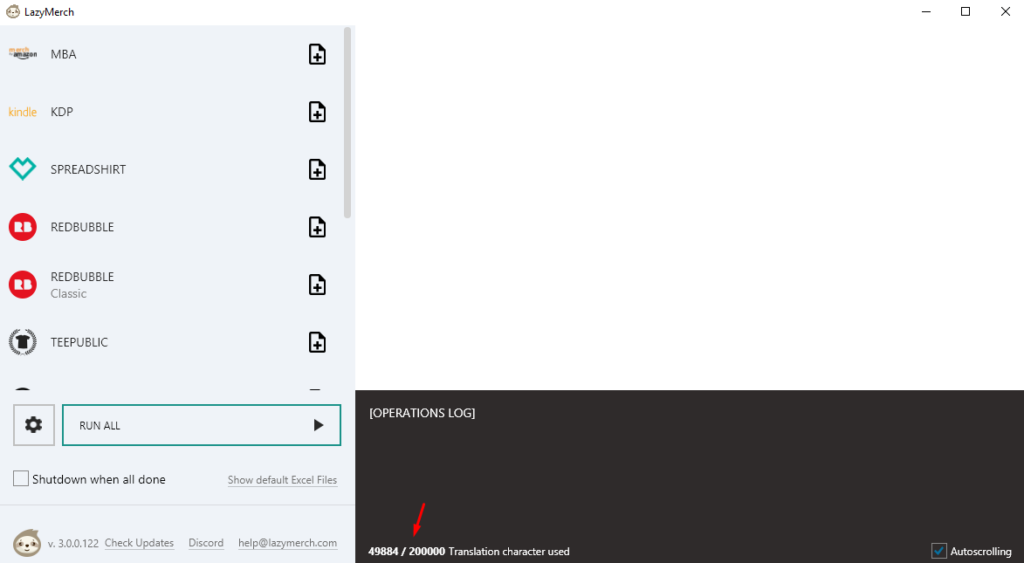Welcher Service wird genutzt?
Alle Übersetzungen werden mit DeepL vorgenommen. Da dies erfahrungsgemäß zu einem besseren Ergebnis der automatischen Übersetzungen führt, haben wir uns für diesen Service entschieden. Trotzdem können wir nicht garantieren, dass durch die automatischen Übersetzungen keine Trademark geschützten Worte vom Übersetzungsservice in das Listing gelangen. Daher empfiehlt es sich, nachträglich immer zu kontrollieren.
Wo sehe ich, wieviele Übersetzungszeichen ich noch habe?
Den aktuellen Stand deiner Übersetzungszeichen bei LazyMerch kannst du im Tool unter dem Operations Log feststellen. Dort steht, wieviele Zeichen du bereits genutzt hast.

Wann werden die Übersetzungszeichen zurückgesetzt?
Einen genauen Tag, an dem du all deine Übersetzungszeichen wiederbekommst, gibt es nicht. Je nachdem, welches Abonnement du besitzt oder ob du zusätzliche Übersetzungspakete erworben hast, steht dir immer eine gewisse Anzahl and Zeichen innerhalb eines 30-tägigen Zeitraumes zur Verfügung.
Es werden immer jene Anzahl an Übersetzungszeichen erstattet, die vor 30 Tagen verwendet wurde. Um dies etwas vereinfacht darzustellen, stellen wir dies anhand einer Tabelle dar:

Wie man anhand dieser Tabelle erkennen kann, gibt es keinen Tag, an dem alle Zeichen erstattet werden. Dies geschieht für die verwendete Anzahl an Übersetzungszeichen immer 30 Tage nach der Nutzung.
Im Idealfall pendelt man also immer innerhalb bzw. kurz vor der zur Verfügung stehenden Zeichenanzahl. Wenn man die zur Verfügung stehende Anzahl des öfteren überschreitet, sollte man sich Gedanken über den Kauf mehrerer Übersetzungszeichen nachdenken oder sein Uploadverhalten so anpassen, dass weniger Zeichen benötigt werden.
Wie erhalte ich mehr Übersetzungszeichen?
Wenn du vieles automatisch übersetzt und dir die standardmäßige Zeichenanzahl nicht ausreicht, kannst du dir in unserem Shop ein Übersetzungspaket dazubuchen. Wenn keines der darin angebotenen Pakete deinem Uploadverhalten gerecht wird, kannst du dich gerne an uns wenden und wir versuchen dir ein Paket zu gestalten, bei dem auch du die Zeichenanzahl nicht überschreitest und trotzdem nicht für viel mehr bezahlst, als du überhaupt nutzt.
Warum sind die Übersetzungszeichen beschränkt?
Die Anbindung an den Übersetzungsdienstleister kostet auch LazyMerch etwas. Je nach Anzahl der Übersetzungszeichen werden uns laufend variable Kosten dafür verrechnet. Um diese abdecken zu können, müssen wir jenen Usern, die mehr Übersetzungszeichen als standardmäßig zur Verfügung gestellt, dies leider auch berechnen.



Your comment is awaiting moderation.
Philosophy is the discipline that studies major and universal questions, such as existence, knowledge, values, reason, and language. It encompasses a vast number of topics and issues, ranging from ethics and political figures to metaphysics and logic. Here are the main nuances of philosophy:
1. Definition of Philosophy
Philosophy comes from the Greek words „philos“ (love) and „sophia“ (wisdom). It is the desire to realize and make sense of the world around us and our place in it.
2. The Main branches of philosophy
– Ontology the study of the essence of being and existence.
– Epistemology the study of the nature and limits of knowledge.
– Ethics the analysis of moral principles and concepts of good deed and evil.
– Logic the study of the forms and principles of correct thinking.
– Socio-political philosophy the study of questions of power, justice and the state.
3. Eminent Philosophers
In the course of the history of philosophy, almost many thinkers have made weighty contributions to this science. Some of the most famous include:
– Socrates, considered the founder of Western philosophy.
– Plato, a pupil of Socrates, developed the doctrine of forms.
– Aristotle, the creator of logic and many of scientific fields.
– Immanuel Kant, known for his Philosophy critical philosophy and work on moral issues.
4. The Relevance of Philosophy in the Modern World
Philosophy remains relevant in the modern world because enables people to understand complex social and moral issues, also develops critical thinking. It influences the legal system, politicians, and various fields of science.
5. Practical Applications of Philosophy
Philosophical ideas enter everyday life. Ethical reflection helps people do the right thing in complex situations, and philosophical analysis contributes to best understanding of issues related to technology, art, and social justice.
Philosophy is including an academic discipline, but also method of thinking that helps us to understand life’s complexities and make informed choices.
Your comment is awaiting moderation.
Philosophy is the discipline that studies fundamental and universal questions, such as existence, cognition, values, mind, and language. It encompasses a vast number of topics and issues, from ethics and political figures to metaphysics and logic. Here are principal aspects of philosophy:
1. Definition of Philosophy
Philosophy comes from the Greek words „philos“ (love) and „sophia“ (wisdom). It is zeal to understand and make sense of the world around us and our place in it.
2. The Main branches of philosophy
– Ontology the study of the essence of being and existence.
– Epistemology the study of the nature and limits of knowledge.
– Ethics the analysis of ethical principles and concepts of good and evil.
– Logic research of the forms and principles of correct thinking.
– Political philosophy the study of questions of power, justice and the state.
3. Notable Philosophers
In the course of the history of philosophy, many thinkers have made significant contributions to this science. Some of the most famous include:
– Socrates, considered the progenitor of Western philosophy.
– Plato, a pupil of Socrates, developed the doctrine of forms.
– Aristotle, the creator of logic and many of scientific fields.
– Immanuel Kant, known for his Henry Miller critical philosophy and work on moral issues.
4. The Relevance of Philosophy in the Modern World
Philosophy remains urgent in the modern world as enables people to understand complex social and moral issues, but also develops critical thinking. It influences the legal system, politicians, and different fields of science.
5. Practical Applications of Philosophy
Philosophical ideas enter everyday life. Ethical reflection helps people do the right thing in difficult situations, and philosophical analysis contributes to most excellent understanding of issues related to technology, art, and social justice.
Philosophy is not only an academic discipline, yes and a way of thinking that helps us to understand life’s complexities and make informed choices.
Your comment is awaiting moderation.
Philosophy is the discipline that studies fundamental and universal questions, including existence, knowledge, values, mind, and language. It covers a vast number of topics and issues, ranging from ethics and politicians to metaphysics and logic. Here are principal aspects of philosophy:
1. Definition of Philosophy
Philosophy comes from the Greek words „philos“ (love) and „sophia“ (wisdom). It is zeal to realize and make sense of the world around us and our place in it.
2. The Main branches of philosophy
– Ontology the study of the essence of being and existence.
– Epistemology the study of the nature and limits of cognition.
– Ethics the analysis of ethical principles and concepts of good deed and evil.
– Logic the study of the forms and principles of correct thinking.
– Socio-political philosophy the study of questions of power, justice and the state.
3. Eminent Philosophers
During the history of philosophy, many thinkers have made significant contributions to this science. Some of the most recognizable include:
– Socrates, considered the progenitor of Western philosophy.
– Plato, a student of Socrates, developed the doctrine of forms.
– Aristotle, the creator of logic and a huge number of scientific fields.
– Immanuel Kant, known for his own Henry Miller critical philosophy and work on moral issues.
4. The Relevance of Philosophy in the Modern World
Philosophy remains relevant in the modern world as it helps people to understand difficult social and ethical issues, also develops critical thinking. It affects the legal system, politicians, and different fields of science.
5. Practical Applications of Philosophy
Philosophical ideas penetrate everyday life. Ethical reflection helps people do the correct thing in difficult situations, and philosophical analysis contributes to greatest understanding of problems related to technology, art, and social justice.
Philosophy is including an academic discipline, but also a way of thinking assists us to understand life’s complexities and make informed choices.